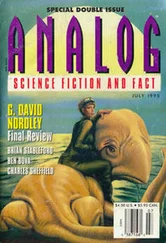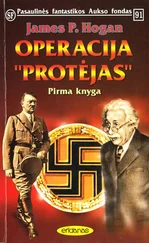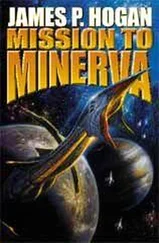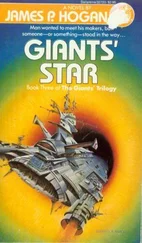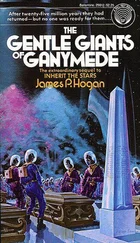James Hogan - Inherit the Stars
Здесь есть возможность читать онлайн «James Hogan - Inherit the Stars» весь текст электронной книги совершенно бесплатно (целиком полную версию без сокращений). В некоторых случаях можно слушать аудио, скачать через торрент в формате fb2 и присутствует краткое содержание. Жанр: Фантастика и фэнтези, на английском языке. Описание произведения, (предисловие) а так же отзывы посетителей доступны на портале библиотеки ЛибКат.
- Название:Inherit the Stars
- Автор:
- Жанр:
- Год:неизвестен
- ISBN:нет данных
- Рейтинг книги:3 / 5. Голосов: 1
-
Избранное:Добавить в избранное
- Отзывы:
-
Ваша оценка:
- 60
- 1
- 2
- 3
- 4
- 5
Inherit the Stars: краткое содержание, описание и аннотация
Предлагаем к чтению аннотацию, описание, краткое содержание или предисловие (зависит от того, что написал сам автор книги «Inherit the Stars»). Если вы не нашли необходимую информацию о книге — напишите в комментариях, мы постараемся отыскать её.
Inherit the Stars — читать онлайн бесплатно полную книгу (весь текст) целиком
Ниже представлен текст книги, разбитый по страницам. Система сохранения места последней прочитанной страницы, позволяет с удобством читать онлайн бесплатно книгу «Inherit the Stars», без необходимости каждый раз заново искать на чём Вы остановились. Поставьте закладку, и сможете в любой момент перейти на страницу, на которой закончили чтение.
Интервал:
Закладка:
"Worse than that, even," Danchekker supplied. "They would have been able to trace the native Minervan species all the way back to their origins; the imported types, however, would extend back through only twenty-five million years or so. Before that, there would have been no record of any ancestors from which they could have descended."
"That’s precisely one of the things I wanted to ask you," Hunt said. He leaned forward and rested his elbows on the table. "Suppose you were a Lunarian biologist and knew only the facts he would have known. What sort of picture would it have added up to?"
Danchekker stopped chewing and thought for a long time, his eyes staring far beyond where Hunt was sitting. At length he shook his head slowly.
"That is a very difficult question to answer. In that situation one might, I suppose, speculate that the Ganymeans had introduced alien species. But on the other hand, that is what a biologist from Earth would think; he would be conditioned to expect a continuous fossil record stretching back over hundreds of millions of years. A Lunarian, without any such conditioning, might not regard the absence of a complete record as in any way abnormal. If that was part of the accepted way of things in the world in which he had grown up…"
Danchekker’s voice faded away for a few seconds. "If I were a Lunarian," he said suddenly, his voice decisive, "I would explain what I saw thus: Life began in the distant past on Minerva, evolved through the accepted process of mutation and selection, and branched into many diverse forms. About twenty-five million years ago, a particularly violent series of mutations occurred in a short time, out of which emerged a new family of forms, radically different in structure from anything before. This family branched to produce its own divergency of species, living alongside the older models, and culminating in the emergence of the Lunarians themselves. Yes, I would explain the new appearances in that way. It’s similar to the appearance of insects on Earth-a whole family in itself, structurally dissimilar to anything else." He thought it over again for a second and then nodded firmly. "Certainly, compared to an explanation of that nature, suggestions of forced interplanetary migrations would appear very farfetched indeed."
"I was hoping you’d say something like that." Hunt nodded, satisfied. "In fact, that’s very much what they appear to have believed. It’s not specifically stated in anything I’ve read, but odds and ends from different places add up to that. But there’s something odd about it as well."
"Oh?"
"There’s a funny word that crops up in a number of places that doesn’t have a direct English equivalent; it means something between ‘manlike’ and ‘man-related.’ They used it to describe many animal types."
"Probably the animals descended from the imported types and related to themselves," Danchekker suggested.
"Yes, exactly. But they also used the same word in a totally different context-to mean ‘ashore,’ ‘on land’… anything to do with dry land. Now, why should a word become synonymous with two such different meanings?"
Danchekker stopped eating again and furrowed his brow.
"I really can’t imagine. Is it important?"
"Neither could I, and I think it is. I’ve done a lot of cross-checking with Linguistics on this, and it all adds up to a very peculiar thing: ‘Manlike’ and ‘dry-land’ became synonymous on Minerva because they did in fact mean the same thing. All the land animals on Minerva were new models. We coined the word terrestoid to describe them in English."
"All of them? You mean that by Charlie’s time there were none of the original Minervan species left at all?" Danchekker sounded amazed.
"That’s what we think-not on land, anyway. There was a full fossil record of plenty of types all the way up to, and including the Ganymeans, but nothing after that-just terrestoids."
"And in the sea?"
"That was different. The old Minervan types continued right through-hence your fish."
Danchekker gazed at Hunt with an expression that almost betrayed open disbelief.
"How extraordinary!" he exclaimed.
The professor’s arm had suddenly become paralyzed and was holding a fork in midair with half a roast potato impaled on the end. "You mean that all the native Minervan land life disappeared-just like that?"
"Well, during a fairly short time, anyway. We’ve been asking for a long time what happened to the Ganymeans. Now it looks more as if the question should be phrased in even broader terms: What happened to the Ganymeans and all their land-dwelling relatives?"
Chapter Twenty-One
For weeks the two scientists debated the mystery of the abrupt disappearance of the native Minervan land dwellers. They ruled out physical catastrophe on the assumption that anything of that kind would have destroyed the terrestoid types as well. The same conclusion applied to climatic cataclysm.
For a while they considered the possibility of an epidemic caused by microorganisms imported with the immigrant animals, one against which the native species enjoyed no inherited, in-built immunity. In the end they dismissed this idea as unlikely on two counts; first, an epidemic sufficiently virulent in its effects to wipe out each and every species of what must have numbered millions, was hard to imagine; second, all information received so far from Ganymede suggested that the Ganymeans had been considerably farther ahead in technical knowledge than either the Lunarians or mankind-surely they could never have made such a blunder.
A variation on this theme supposed that germ warfare had broken out, escalated, and got out of control. Both the previous objections carried less weight when viewed in this context; in the end, this explanation was accepted as possible. That left only one other possibility: some kind of chemical change in the Minervan atmosphere to which the native species hadn’t been capable of adapting to but the terrestoids had. But what?
While the pros and cons of these alternatives were still being evaluated on Jupiter Five, the laser link to Earth brought details of a new row that had broken out in Navcomms. A faction of Pure Earthists had produced calculations showing that the Lunarians could never have survived on Minerva at all, let alone flourished there; at that distance from the Sun it would simply have been too cold. They also insisted that water could never have existed on the surface in a liquid state and held this fact as proof that wherever the world shown on Charlie’s maps had been, it couldn’t have been anywhere near the Asteroids.
Against this attack the various camps of Minervaists concluded a hasty alliance and opened counterfire with calculations of their own, which invoked the greenhouse effect of atmospheric carbon dioxide to show that a substantially higher temperature could have been sustained. They demonstrated further that the percentage of carbon dioxide required to produce the mean temperature that they had already estimated by other means was precisely the figure arrived at by Professor Schorn in his deduction of the composition of the Minervan atmosphere from an analysis of Charlie’s cell metabolism and respiratory system. The land mine that finally demolished the Pure Earthist position was Schorn’s later pronouncement that Charlie exhibited several physiological signs implying adaptation to an abnormally high level of carbon dioxide.
Their curiosity stimulated by all this sudden interest in the amount of carbon dioxide in the Minervan atmosphere, Hunt and Danchekker devised a separate experiment of their own. Combining Hunt’s mathematical skill with Danchekker’s knowledge of quantitative molecular biology, they developed a computer model of generalized Minervan microchemical behavior potentials, based on data derived from the native fish. It took them over three months to perfect. Then they applied to the model a series of mathematical operators that simulated the effects of different chemical agents in the environment. When he viewed the results on the screen in one of the console rooms Danchekker’s conclusion was quite definite: "Any air-breathing life form that evolved from the same primitive ancestors as this fish and inherited the same fundamental system of microchemistry, would be extremely susceptible to a family of toxins that includes carbon dioxide-far more so than the majority of terrestrial species."
Читать дальшеИнтервал:
Закладка:
Похожие книги на «Inherit the Stars»
Представляем Вашему вниманию похожие книги на «Inherit the Stars» списком для выбора. Мы отобрали схожую по названию и смыслу литературу в надежде предоставить читателям больше вариантов отыскать новые, интересные, ещё непрочитанные произведения.
Обсуждение, отзывы о книге «Inherit the Stars» и просто собственные мнения читателей. Оставьте ваши комментарии, напишите, что Вы думаете о произведении, его смысле или главных героях. Укажите что конкретно понравилось, а что нет, и почему Вы так считаете.


![Лаура Бренз - Потомственная ведьма[Inherit the Witch]](/books/79609/laura-brenz-potomstvennaya-vedma-inherit-the-witch-thumb.webp)
